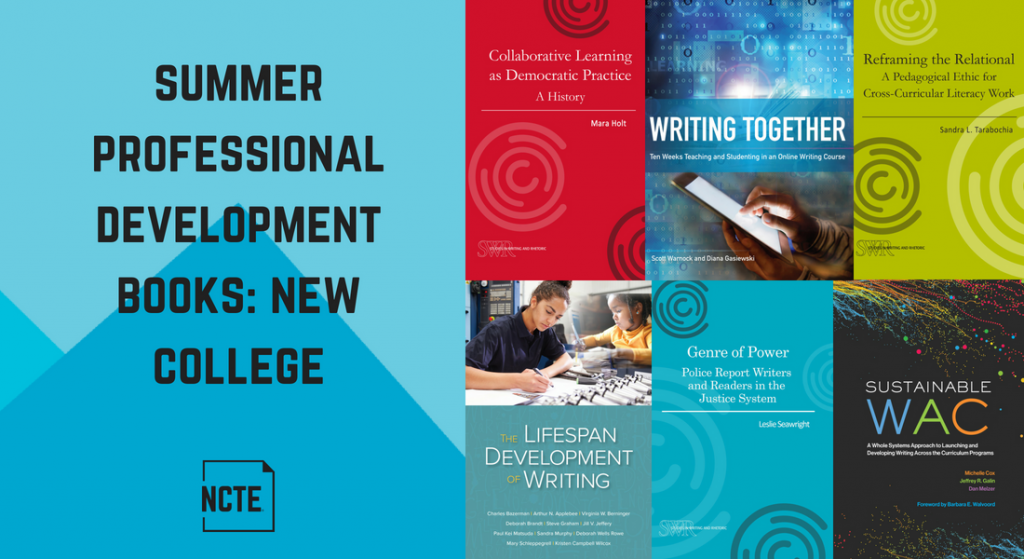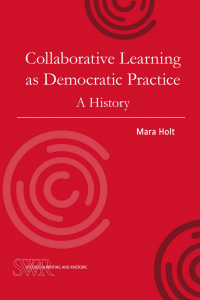Summer is an excellent time for recharging; it’s also an excellent time for finding new inspiration. NCTE members have written excellent books on a range of topics you might find interesting, and we’ve pulled together several new college titles for your review, including many new Studies in Writing and Rhetoric Series titles.
May is a perfect month for stocking up on these titles and others because we’re offering a 25% discount on all our books through the end of the month. Use the code APPRECIATE2018. Happy reading!
Collaborative Learning as Democratic Practice: A History by Mara Holt
Collaborative learning is not only a standard part of writing pedagogy, but it is also a part of contemporary culture. Holt examines the rich historical and political contexts of collaborative learning, starting with John Dewey’s impact on progressive education in the early twentieth century.
Read a sample chapter and learn more about the book and the writing process on the blog.
Genre of Power: Police Report Writers and Readers in the Justice System by Leslie Seawright
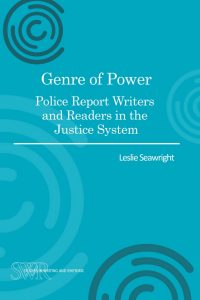 Leslie Seawright describes the journey of a police report as it travels through the criminal justice system. Tracing the path of a police report from writer, to supervisor, to prosecutor, to defense lawyer, to judge, this study exposes the way in which power, agency, and authority circulate and accrue between writers and readers.
Leslie Seawright describes the journey of a police report as it travels through the criminal justice system. Tracing the path of a police report from writer, to supervisor, to prosecutor, to defense lawyer, to judge, this study exposes the way in which power, agency, and authority circulate and accrue between writers and readers.
Listen to an interview with the author and learn more about the complex work of a simple police report.
Inside the Subject: A Theory of Identity for the Study of Writing by Raúl Sánchez
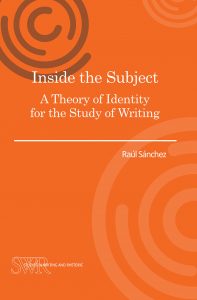 This book develops a new theoretical approach to the study of writing by fusing key aspects of postmodern theory with the empirical sensibilities of composition studies and with that field’s long-standing investment in writerly agency.
This book develops a new theoretical approach to the study of writing by fusing key aspects of postmodern theory with the empirical sensibilities of composition studies and with that field’s long-standing investment in writerly agency.
Listen to Raúl Sánchez read an excerpt from the book.
The Lifespan Development of Writing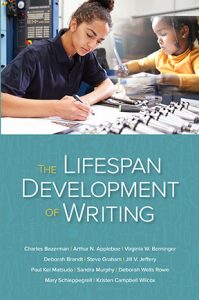 by Charles Bazerman, Arthur N. Applebee, Virginia W. Berninger, Deborah Brandt, Steve Graham, Jill V. Jeffery, Paul Kei Matsuda, Sandra Murphy, Deborah Wells Rowe, Mary Schleppegrell, and Kristen Campbell Wilcox
by Charles Bazerman, Arthur N. Applebee, Virginia W. Berninger, Deborah Brandt, Steve Graham, Jill V. Jeffery, Paul Kei Matsuda, Sandra Murphy, Deborah Wells Rowe, Mary Schleppegrell, and Kristen Campbell Wilcox
The Lifespan Development of Writing presents the results of a four-year project to synthesize the research on writing development at different ages from multiple, cross-disciplinary perspectives, including psychological, linguistic, sociocultural, and curricular. First collectively offering the joint statement “Toward an Understanding of Writing Development across the Lifespan,” the authors then focus individually on specific periods of writing development, including early childhood, adolescence, and working adulthood, looked at from different angles.
Read a sample chapter and learn more about why coauthor Chuck Bazerman is still scribbling after all these years.
Reframing the Relational: A Pedagogical Ethic for Cross-Curricular Literacy Work by Sandra L. Tarabochia
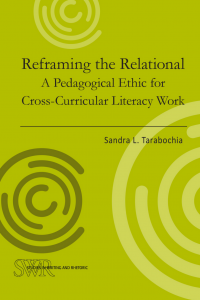 Reframing the Relational examines how writing specialists and faculty in other disciplines communicate with each other in face-to-face conversations about teaching writing. Sandra L. Tarabochia argues that a pedagogical approach to faculty interactions in Writing Across the Curriculum (WAC) and Writing in the Disciplines (WID) contexts can enhance cross-disciplinary communication and collaboration and ultimately lead to more productive, sustainable initiatives.
Reframing the Relational examines how writing specialists and faculty in other disciplines communicate with each other in face-to-face conversations about teaching writing. Sandra L. Tarabochia argues that a pedagogical approach to faculty interactions in Writing Across the Curriculum (WAC) and Writing in the Disciplines (WID) contexts can enhance cross-disciplinary communication and collaboration and ultimately lead to more productive, sustainable initiatives.
Listen to an interview with the author.
Sustainable WAC: A Whole Systems Approach to Launching and Developing Writing Across the Curriculum Programs by Michelle Cox, Jeffrey Galin, and Dan Melzer
 Current or former WAC program directors Michelle Cox, Jeffrey R. Galin, and Dan Melzer introduce a theoretical framework for WAC program development that takes into account the diverse contexts of today’s institutions of higher education, aids WAC program directors in thinking strategically as they develop programs, and integrates a focus on program sustainability. Sustainable WAC lays out principles, strategies, and tactics to help WAC program directors launch, relaunch, or reinvigorate programs within the complicated systems of today’s colleges and universities.
Current or former WAC program directors Michelle Cox, Jeffrey R. Galin, and Dan Melzer introduce a theoretical framework for WAC program development that takes into account the diverse contexts of today’s institutions of higher education, aids WAC program directors in thinking strategically as they develop programs, and integrates a focus on program sustainability. Sustainable WAC lays out principles, strategies, and tactics to help WAC program directors launch, relaunch, or reinvigorate programs within the complicated systems of today’s colleges and universities.
For more insight into the writing and creation of this book, read this blog post written by the authors.
Translanguaging outside the Academy: Negotiating Rhetoric and Healthcare in the Spanish Caribbean by Rachel Bloom-Pojar
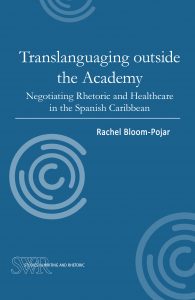 Moving outside of classroom-based and English-dominant contexts, Rachel Bloom-Pojar draws from an ethnographic study of a summer health program in the Dominican Republic to examine what exactly rhetorical translanguaging might look like, arguing for a rhetorical approach that accounts for stigma, race, and institutional constraints.
Moving outside of classroom-based and English-dominant contexts, Rachel Bloom-Pojar draws from an ethnographic study of a summer health program in the Dominican Republic to examine what exactly rhetorical translanguaging might look like, arguing for a rhetorical approach that accounts for stigma, race, and institutional constraints.
Read a sample chapter here.
Writing Together: Ten Weeks Teaching and Studenting in an Online Writing Course by Scott Warnock and Diana Gasiewski
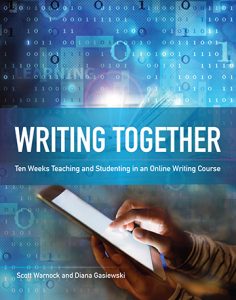 This book narrates the experience of an asynchronous OWC through the dual perspective of the teacher, Scott, and a student, Diana Gasiewski, who participated in that OWC. Both teacher and student describe their strategies, activities, approaches, thoughts, and responses as they move week by week through the experience of teaching and taking an OWC.
This book narrates the experience of an asynchronous OWC through the dual perspective of the teacher, Scott, and a student, Diana Gasiewski, who participated in that OWC. Both teacher and student describe their strategies, activities, approaches, thoughts, and responses as they move week by week through the experience of teaching and taking an OWC.
Learn more about the authors’ experiences writing the book in this interview and this blog post.

